Heart Disease Treatment in Private Hospitals: Dallah Hospital KSA
VerifiedAdded on 2023/06/15
|13
|3550
|247
Report
AI Summary
This assignment provides an overview of heart disease treatment within private hospitals in Saudi Arabia, with a specific focus on Dallah Hospital. It examines the services and facilities offered, including advanced technologies like electrocardiography and echocardiography, as well as specialized units like coronary care. The report also discusses the advantages and disadvantages of private healthcare in the region, including funding mechanisms and the potential impact of privatization. It highlights the Saudi government's investment in healthcare and the role of private sectors in delivering cardiac care, while also addressing concerns about potential over-treatment driven by financial incentives. Desklib offers access to this report and other study tools for students.
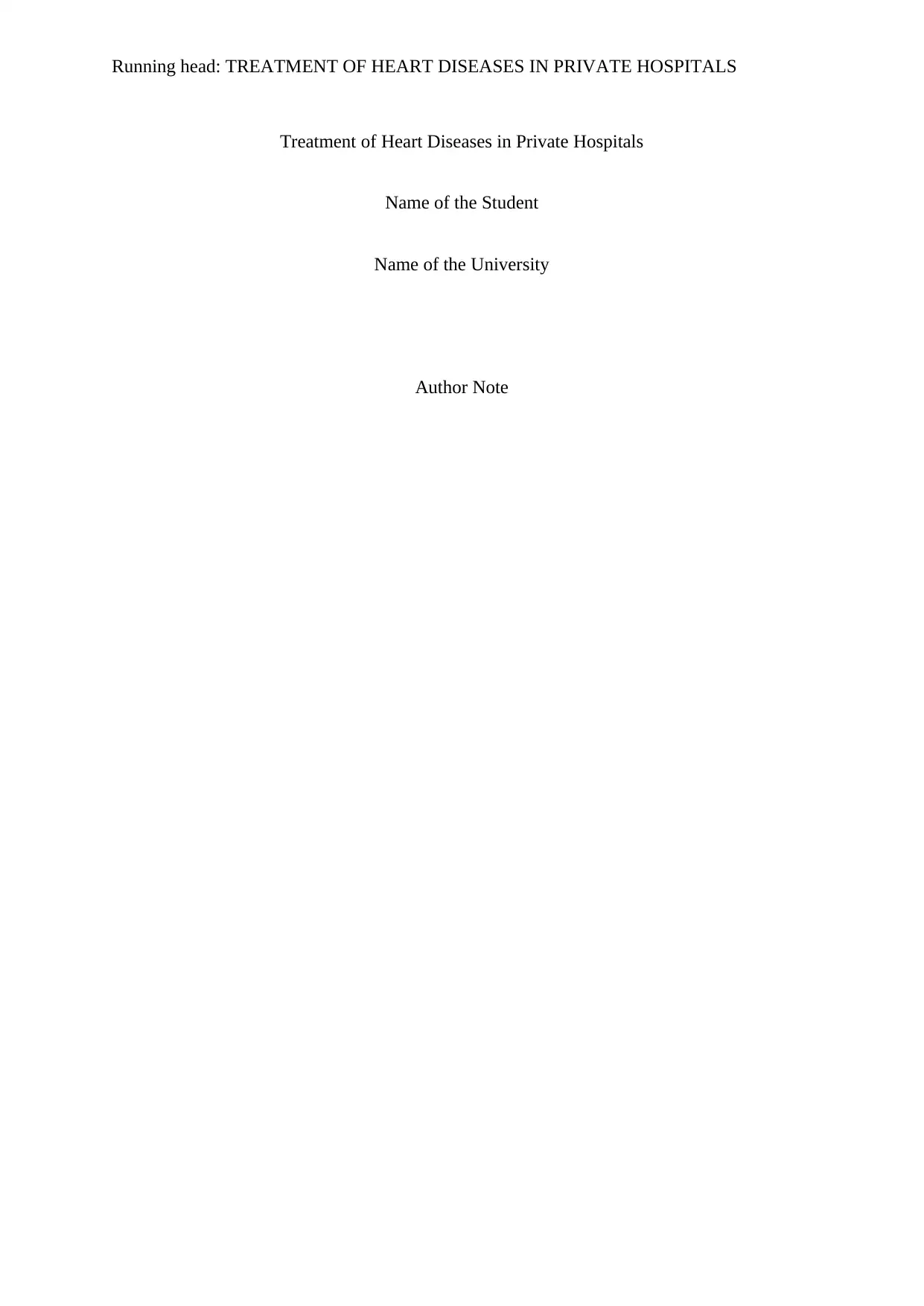
Running head: TREATMENT OF HEART DISEASES IN PRIVATE HOSPITALS
Treatment of Heart Diseases in Private Hospitals
Name of the Student
Name of the University
Author Note
Treatment of Heart Diseases in Private Hospitals
Name of the Student
Name of the University
Author Note
Paraphrase This Document
Need a fresh take? Get an instant paraphrase of this document with our AI Paraphraser
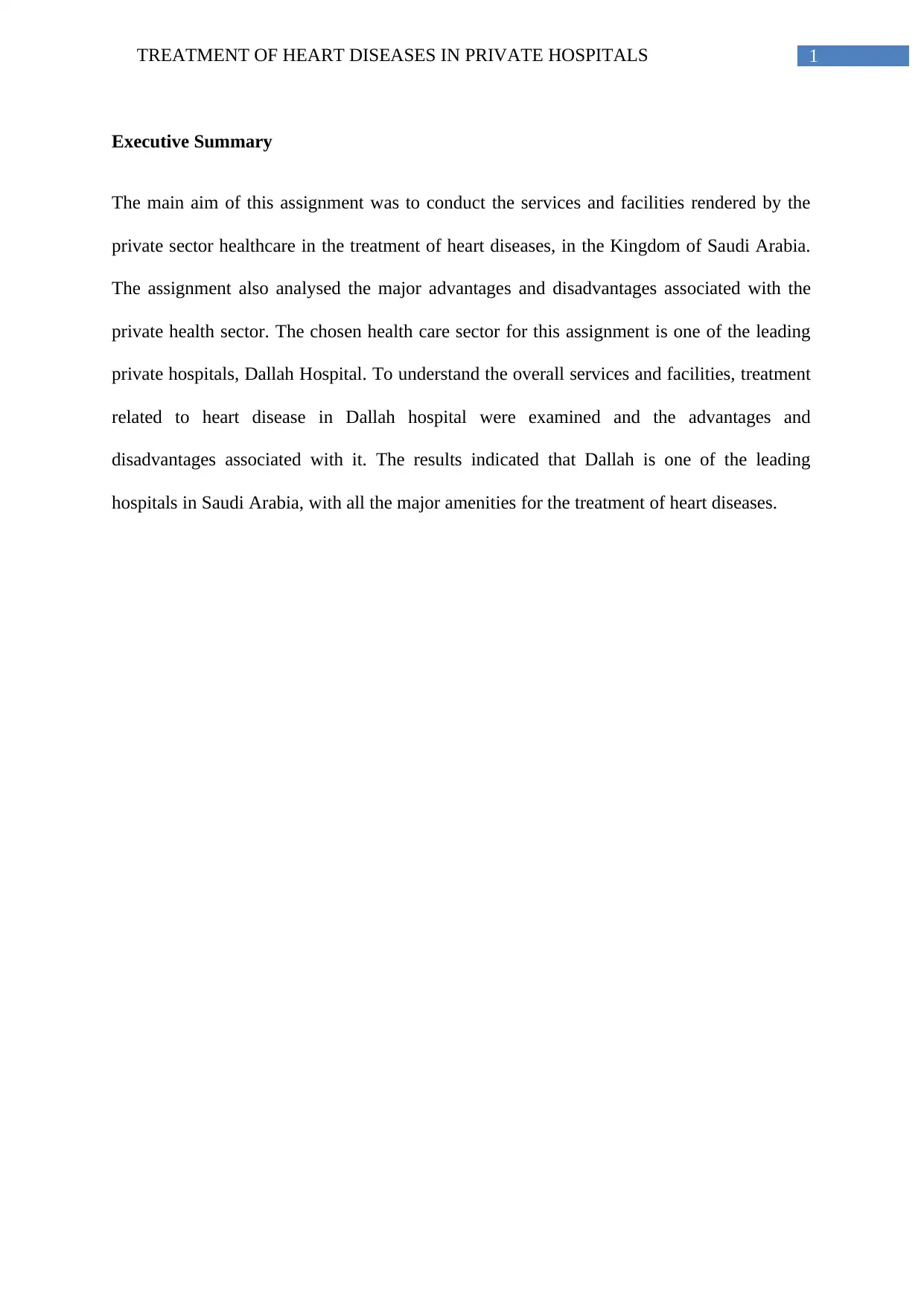
1TREATMENT OF HEART DISEASES IN PRIVATE HOSPITALS
Executive Summary
The main aim of this assignment was to conduct the services and facilities rendered by the
private sector healthcare in the treatment of heart diseases, in the Kingdom of Saudi Arabia.
The assignment also analysed the major advantages and disadvantages associated with the
private health sector. The chosen health care sector for this assignment is one of the leading
private hospitals, Dallah Hospital. To understand the overall services and facilities, treatment
related to heart disease in Dallah hospital were examined and the advantages and
disadvantages associated with it. The results indicated that Dallah is one of the leading
hospitals in Saudi Arabia, with all the major amenities for the treatment of heart diseases.
Executive Summary
The main aim of this assignment was to conduct the services and facilities rendered by the
private sector healthcare in the treatment of heart diseases, in the Kingdom of Saudi Arabia.
The assignment also analysed the major advantages and disadvantages associated with the
private health sector. The chosen health care sector for this assignment is one of the leading
private hospitals, Dallah Hospital. To understand the overall services and facilities, treatment
related to heart disease in Dallah hospital were examined and the advantages and
disadvantages associated with it. The results indicated that Dallah is one of the leading
hospitals in Saudi Arabia, with all the major amenities for the treatment of heart diseases.
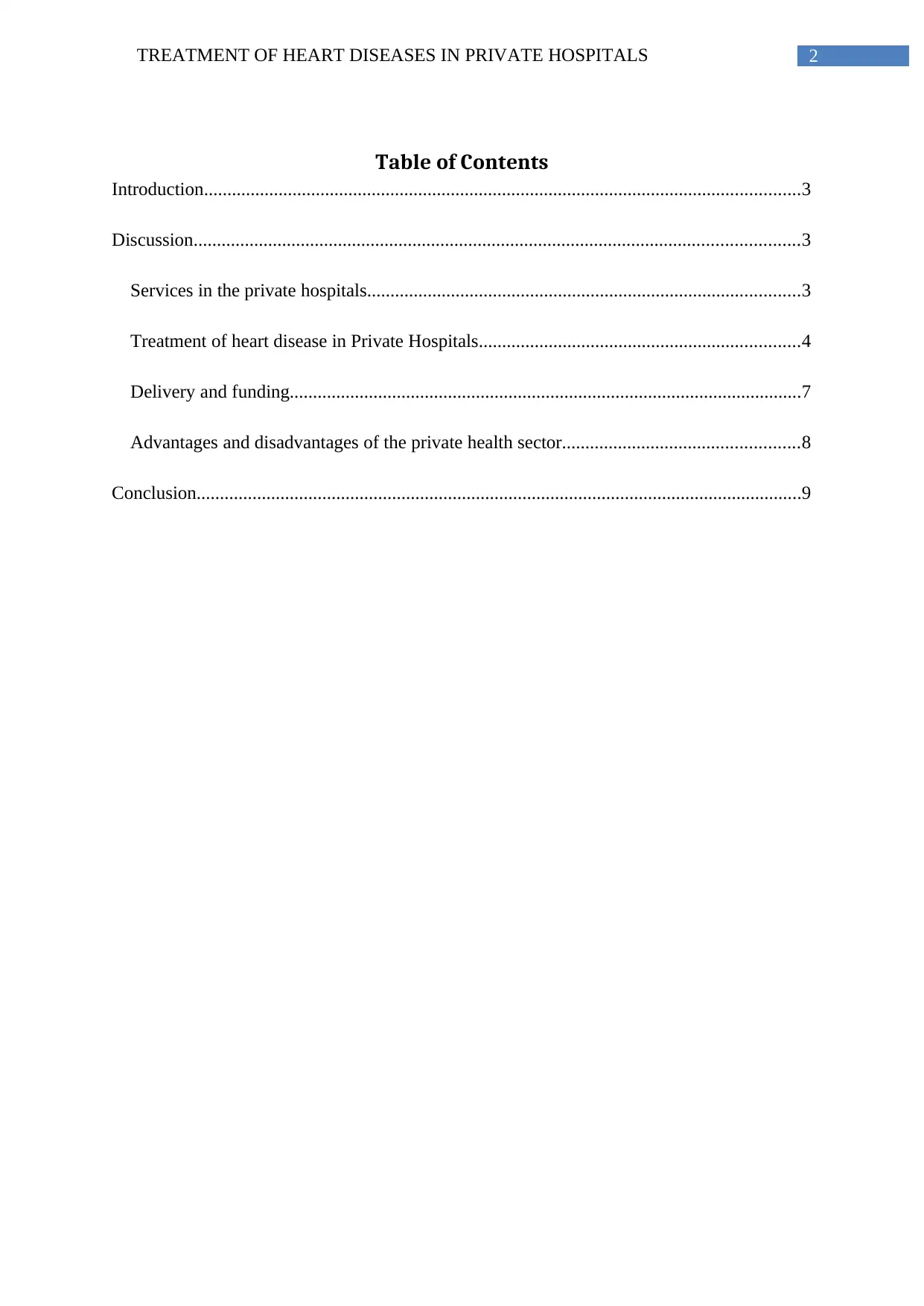
2TREATMENT OF HEART DISEASES IN PRIVATE HOSPITALS
Table of Contents
Introduction................................................................................................................................3
Discussion..................................................................................................................................3
Services in the private hospitals.............................................................................................3
Treatment of heart disease in Private Hospitals.....................................................................4
Delivery and funding..............................................................................................................7
Advantages and disadvantages of the private health sector...................................................8
Conclusion..................................................................................................................................9
Table of Contents
Introduction................................................................................................................................3
Discussion..................................................................................................................................3
Services in the private hospitals.............................................................................................3
Treatment of heart disease in Private Hospitals.....................................................................4
Delivery and funding..............................................................................................................7
Advantages and disadvantages of the private health sector...................................................8
Conclusion..................................................................................................................................9
⊘ This is a preview!⊘
Do you want full access?
Subscribe today to unlock all pages.

Trusted by 1+ million students worldwide
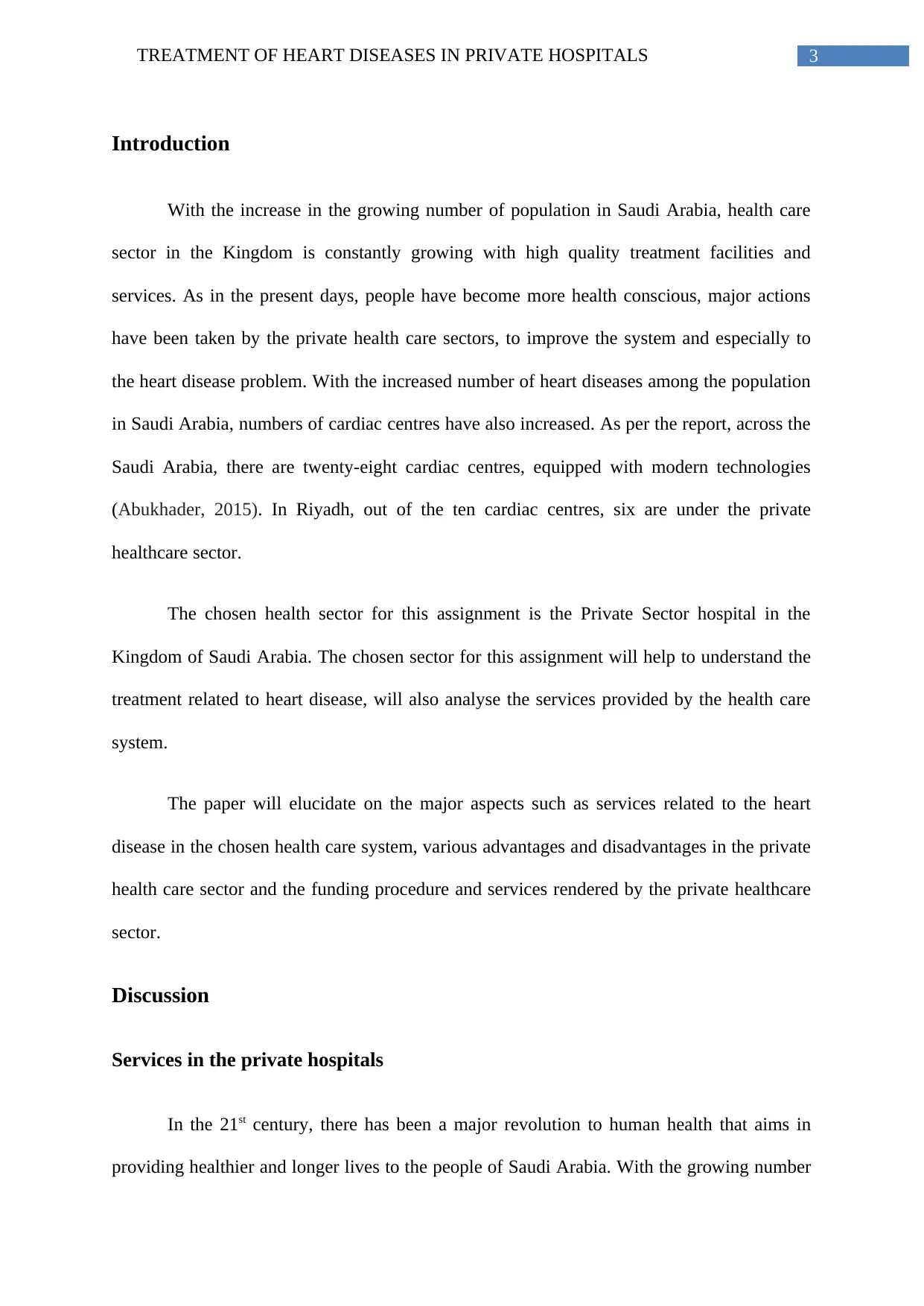
3TREATMENT OF HEART DISEASES IN PRIVATE HOSPITALS
Introduction
With the increase in the growing number of population in Saudi Arabia, health care
sector in the Kingdom is constantly growing with high quality treatment facilities and
services. As in the present days, people have become more health conscious, major actions
have been taken by the private health care sectors, to improve the system and especially to
the heart disease problem. With the increased number of heart diseases among the population
in Saudi Arabia, numbers of cardiac centres have also increased. As per the report, across the
Saudi Arabia, there are twenty-eight cardiac centres, equipped with modern technologies
(Abukhader, 2015). In Riyadh, out of the ten cardiac centres, six are under the private
healthcare sector.
The chosen health sector for this assignment is the Private Sector hospital in the
Kingdom of Saudi Arabia. The chosen sector for this assignment will help to understand the
treatment related to heart disease, will also analyse the services provided by the health care
system.
The paper will elucidate on the major aspects such as services related to the heart
disease in the chosen health care system, various advantages and disadvantages in the private
health care sector and the funding procedure and services rendered by the private healthcare
sector.
Discussion
Services in the private hospitals
In the 21st century, there has been a major revolution to human health that aims in
providing healthier and longer lives to the people of Saudi Arabia. With the growing number
Introduction
With the increase in the growing number of population in Saudi Arabia, health care
sector in the Kingdom is constantly growing with high quality treatment facilities and
services. As in the present days, people have become more health conscious, major actions
have been taken by the private health care sectors, to improve the system and especially to
the heart disease problem. With the increased number of heart diseases among the population
in Saudi Arabia, numbers of cardiac centres have also increased. As per the report, across the
Saudi Arabia, there are twenty-eight cardiac centres, equipped with modern technologies
(Abukhader, 2015). In Riyadh, out of the ten cardiac centres, six are under the private
healthcare sector.
The chosen health sector for this assignment is the Private Sector hospital in the
Kingdom of Saudi Arabia. The chosen sector for this assignment will help to understand the
treatment related to heart disease, will also analyse the services provided by the health care
system.
The paper will elucidate on the major aspects such as services related to the heart
disease in the chosen health care system, various advantages and disadvantages in the private
health care sector and the funding procedure and services rendered by the private healthcare
sector.
Discussion
Services in the private hospitals
In the 21st century, there has been a major revolution to human health that aims in
providing healthier and longer lives to the people of Saudi Arabia. With the growing number
Paraphrase This Document
Need a fresh take? Get an instant paraphrase of this document with our AI Paraphraser
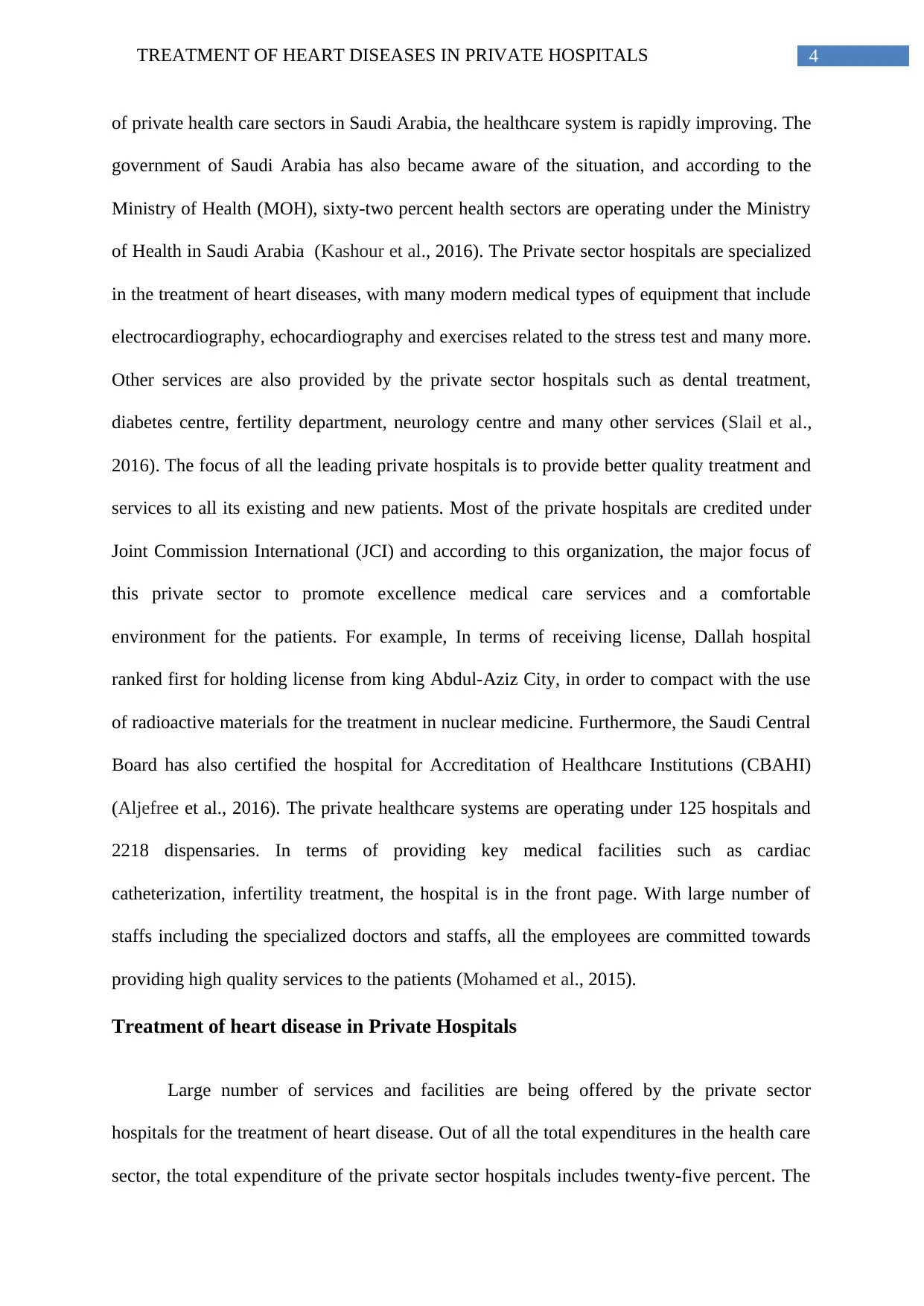
4TREATMENT OF HEART DISEASES IN PRIVATE HOSPITALS
of private health care sectors in Saudi Arabia, the healthcare system is rapidly improving. The
government of Saudi Arabia has also became aware of the situation, and according to the
Ministry of Health (MOH), sixty-two percent health sectors are operating under the Ministry
of Health in Saudi Arabia (Kashour et al., 2016). The Private sector hospitals are specialized
in the treatment of heart diseases, with many modern medical types of equipment that include
electrocardiography, echocardiography and exercises related to the stress test and many more.
Other services are also provided by the private sector hospitals such as dental treatment,
diabetes centre, fertility department, neurology centre and many other services (Slail et al.,
2016). The focus of all the leading private hospitals is to provide better quality treatment and
services to all its existing and new patients. Most of the private hospitals are credited under
Joint Commission International (JCI) and according to this organization, the major focus of
this private sector to promote excellence medical care services and a comfortable
environment for the patients. For example, In terms of receiving license, Dallah hospital
ranked first for holding license from king Abdul-Aziz City, in order to compact with the use
of radioactive materials for the treatment in nuclear medicine. Furthermore, the Saudi Central
Board has also certified the hospital for Accreditation of Healthcare Institutions (CBAHI)
(Aljefree et al., 2016). The private healthcare systems are operating under 125 hospitals and
2218 dispensaries. In terms of providing key medical facilities such as cardiac
catheterization, infertility treatment, the hospital is in the front page. With large number of
staffs including the specialized doctors and staffs, all the employees are committed towards
providing high quality services to the patients (Mohamed et al., 2015).
Treatment of heart disease in Private Hospitals
Large number of services and facilities are being offered by the private sector
hospitals for the treatment of heart disease. Out of all the total expenditures in the health care
sector, the total expenditure of the private sector hospitals includes twenty-five percent. The
of private health care sectors in Saudi Arabia, the healthcare system is rapidly improving. The
government of Saudi Arabia has also became aware of the situation, and according to the
Ministry of Health (MOH), sixty-two percent health sectors are operating under the Ministry
of Health in Saudi Arabia (Kashour et al., 2016). The Private sector hospitals are specialized
in the treatment of heart diseases, with many modern medical types of equipment that include
electrocardiography, echocardiography and exercises related to the stress test and many more.
Other services are also provided by the private sector hospitals such as dental treatment,
diabetes centre, fertility department, neurology centre and many other services (Slail et al.,
2016). The focus of all the leading private hospitals is to provide better quality treatment and
services to all its existing and new patients. Most of the private hospitals are credited under
Joint Commission International (JCI) and according to this organization, the major focus of
this private sector to promote excellence medical care services and a comfortable
environment for the patients. For example, In terms of receiving license, Dallah hospital
ranked first for holding license from king Abdul-Aziz City, in order to compact with the use
of radioactive materials for the treatment in nuclear medicine. Furthermore, the Saudi Central
Board has also certified the hospital for Accreditation of Healthcare Institutions (CBAHI)
(Aljefree et al., 2016). The private healthcare systems are operating under 125 hospitals and
2218 dispensaries. In terms of providing key medical facilities such as cardiac
catheterization, infertility treatment, the hospital is in the front page. With large number of
staffs including the specialized doctors and staffs, all the employees are committed towards
providing high quality services to the patients (Mohamed et al., 2015).
Treatment of heart disease in Private Hospitals
Large number of services and facilities are being offered by the private sector
hospitals for the treatment of heart disease. Out of all the total expenditures in the health care
sector, the total expenditure of the private sector hospitals includes twenty-five percent. The
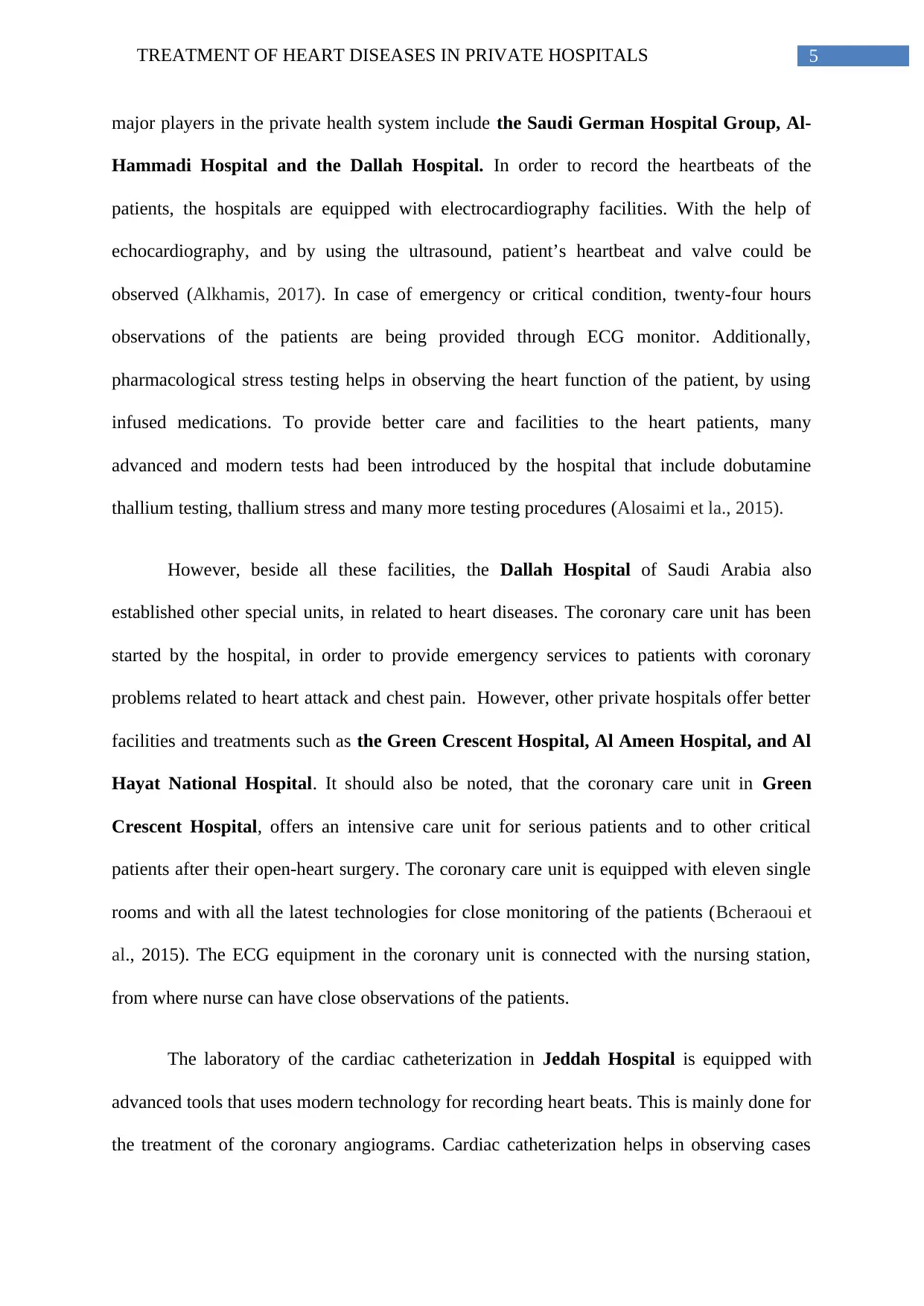
5TREATMENT OF HEART DISEASES IN PRIVATE HOSPITALS
major players in the private health system include the Saudi German Hospital Group, Al-
Hammadi Hospital and the Dallah Hospital. In order to record the heartbeats of the
patients, the hospitals are equipped with electrocardiography facilities. With the help of
echocardiography, and by using the ultrasound, patient’s heartbeat and valve could be
observed (Alkhamis, 2017). In case of emergency or critical condition, twenty-four hours
observations of the patients are being provided through ECG monitor. Additionally,
pharmacological stress testing helps in observing the heart function of the patient, by using
infused medications. To provide better care and facilities to the heart patients, many
advanced and modern tests had been introduced by the hospital that include dobutamine
thallium testing, thallium stress and many more testing procedures (Alosaimi et la., 2015).
However, beside all these facilities, the Dallah Hospital of Saudi Arabia also
established other special units, in related to heart diseases. The coronary care unit has been
started by the hospital, in order to provide emergency services to patients with coronary
problems related to heart attack and chest pain. However, other private hospitals offer better
facilities and treatments such as the Green Crescent Hospital, Al Ameen Hospital, and Al
Hayat National Hospital. It should also be noted, that the coronary care unit in Green
Crescent Hospital, offers an intensive care unit for serious patients and to other critical
patients after their open-heart surgery. The coronary care unit is equipped with eleven single
rooms and with all the latest technologies for close monitoring of the patients (Bcheraoui et
al., 2015). The ECG equipment in the coronary unit is connected with the nursing station,
from where nurse can have close observations of the patients.
The laboratory of the cardiac catheterization in Jeddah Hospital is equipped with
advanced tools that uses modern technology for recording heart beats. This is mainly done for
the treatment of the coronary angiograms. Cardiac catheterization helps in observing cases
major players in the private health system include the Saudi German Hospital Group, Al-
Hammadi Hospital and the Dallah Hospital. In order to record the heartbeats of the
patients, the hospitals are equipped with electrocardiography facilities. With the help of
echocardiography, and by using the ultrasound, patient’s heartbeat and valve could be
observed (Alkhamis, 2017). In case of emergency or critical condition, twenty-four hours
observations of the patients are being provided through ECG monitor. Additionally,
pharmacological stress testing helps in observing the heart function of the patient, by using
infused medications. To provide better care and facilities to the heart patients, many
advanced and modern tests had been introduced by the hospital that include dobutamine
thallium testing, thallium stress and many more testing procedures (Alosaimi et la., 2015).
However, beside all these facilities, the Dallah Hospital of Saudi Arabia also
established other special units, in related to heart diseases. The coronary care unit has been
started by the hospital, in order to provide emergency services to patients with coronary
problems related to heart attack and chest pain. However, other private hospitals offer better
facilities and treatments such as the Green Crescent Hospital, Al Ameen Hospital, and Al
Hayat National Hospital. It should also be noted, that the coronary care unit in Green
Crescent Hospital, offers an intensive care unit for serious patients and to other critical
patients after their open-heart surgery. The coronary care unit is equipped with eleven single
rooms and with all the latest technologies for close monitoring of the patients (Bcheraoui et
al., 2015). The ECG equipment in the coronary unit is connected with the nursing station,
from where nurse can have close observations of the patients.
The laboratory of the cardiac catheterization in Jeddah Hospital is equipped with
advanced tools that uses modern technology for recording heart beats. This is mainly done for
the treatment of the coronary angiograms. Cardiac catheterization helps in observing cases
⊘ This is a preview!⊘
Do you want full access?
Subscribe today to unlock all pages.

Trusted by 1+ million students worldwide
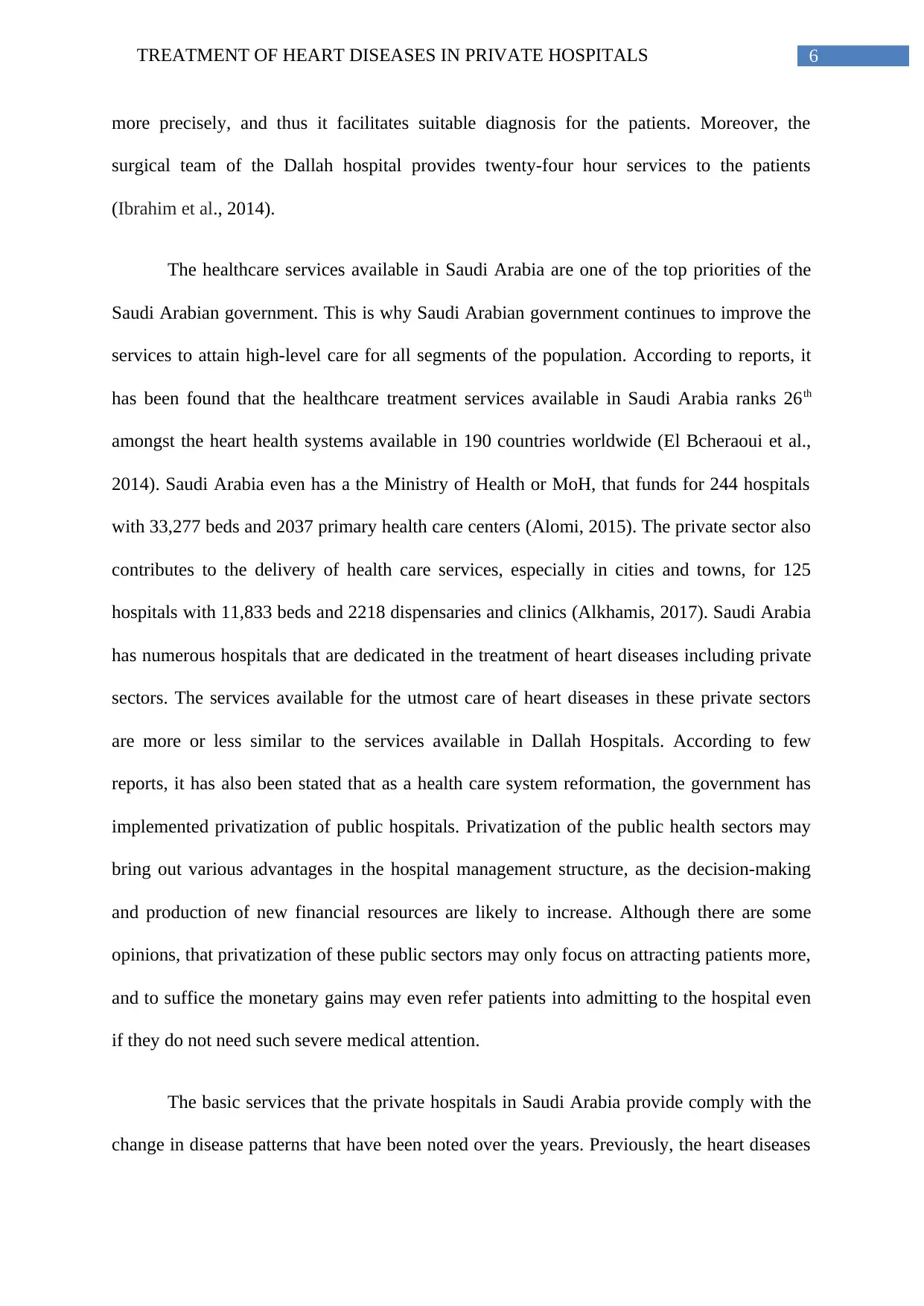
6TREATMENT OF HEART DISEASES IN PRIVATE HOSPITALS
more precisely, and thus it facilitates suitable diagnosis for the patients. Moreover, the
surgical team of the Dallah hospital provides twenty-four hour services to the patients
(Ibrahim et al., 2014).
The healthcare services available in Saudi Arabia are one of the top priorities of the
Saudi Arabian government. This is why Saudi Arabian government continues to improve the
services to attain high-level care for all segments of the population. According to reports, it
has been found that the healthcare treatment services available in Saudi Arabia ranks 26th
amongst the heart health systems available in 190 countries worldwide (El Bcheraoui et al.,
2014). Saudi Arabia even has a the Ministry of Health or MoH, that funds for 244 hospitals
with 33,277 beds and 2037 primary health care centers (Alomi, 2015). The private sector also
contributes to the delivery of health care services, especially in cities and towns, for 125
hospitals with 11,833 beds and 2218 dispensaries and clinics (Alkhamis, 2017). Saudi Arabia
has numerous hospitals that are dedicated in the treatment of heart diseases including private
sectors. The services available for the utmost care of heart diseases in these private sectors
are more or less similar to the services available in Dallah Hospitals. According to few
reports, it has also been stated that as a health care system reformation, the government has
implemented privatization of public hospitals. Privatization of the public health sectors may
bring out various advantages in the hospital management structure, as the decision-making
and production of new financial resources are likely to increase. Although there are some
opinions, that privatization of these public sectors may only focus on attracting patients more,
and to suffice the monetary gains may even refer patients into admitting to the hospital even
if they do not need such severe medical attention.
The basic services that the private hospitals in Saudi Arabia provide comply with the
change in disease patterns that have been noted over the years. Previously, the heart diseases
more precisely, and thus it facilitates suitable diagnosis for the patients. Moreover, the
surgical team of the Dallah hospital provides twenty-four hour services to the patients
(Ibrahim et al., 2014).
The healthcare services available in Saudi Arabia are one of the top priorities of the
Saudi Arabian government. This is why Saudi Arabian government continues to improve the
services to attain high-level care for all segments of the population. According to reports, it
has been found that the healthcare treatment services available in Saudi Arabia ranks 26th
amongst the heart health systems available in 190 countries worldwide (El Bcheraoui et al.,
2014). Saudi Arabia even has a the Ministry of Health or MoH, that funds for 244 hospitals
with 33,277 beds and 2037 primary health care centers (Alomi, 2015). The private sector also
contributes to the delivery of health care services, especially in cities and towns, for 125
hospitals with 11,833 beds and 2218 dispensaries and clinics (Alkhamis, 2017). Saudi Arabia
has numerous hospitals that are dedicated in the treatment of heart diseases including private
sectors. The services available for the utmost care of heart diseases in these private sectors
are more or less similar to the services available in Dallah Hospitals. According to few
reports, it has also been stated that as a health care system reformation, the government has
implemented privatization of public hospitals. Privatization of the public health sectors may
bring out various advantages in the hospital management structure, as the decision-making
and production of new financial resources are likely to increase. Although there are some
opinions, that privatization of these public sectors may only focus on attracting patients more,
and to suffice the monetary gains may even refer patients into admitting to the hospital even
if they do not need such severe medical attention.
The basic services that the private hospitals in Saudi Arabia provide comply with the
change in disease patterns that have been noted over the years. Previously, the heart diseases
Paraphrase This Document
Need a fresh take? Get an instant paraphrase of this document with our AI Paraphraser
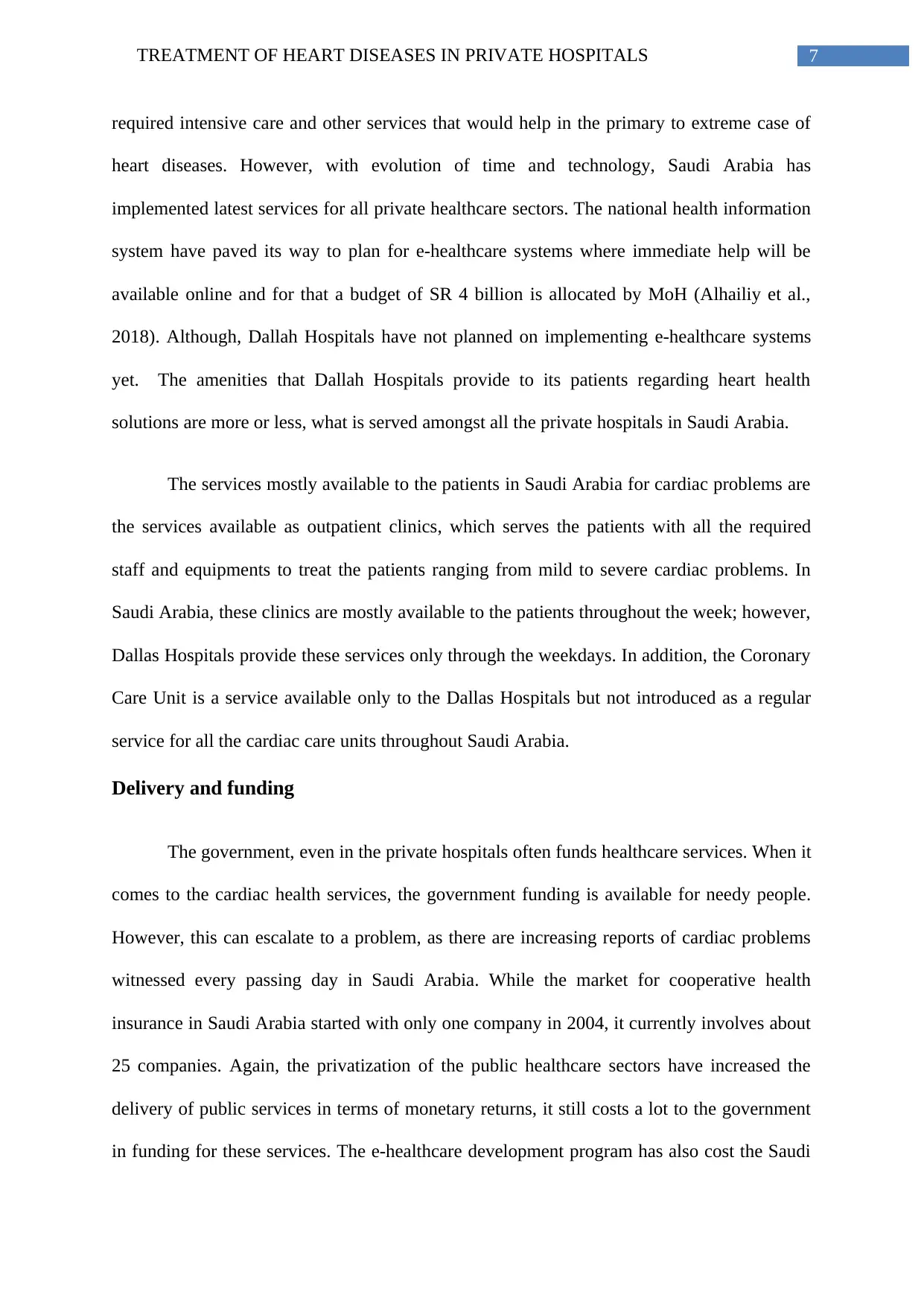
7TREATMENT OF HEART DISEASES IN PRIVATE HOSPITALS
required intensive care and other services that would help in the primary to extreme case of
heart diseases. However, with evolution of time and technology, Saudi Arabia has
implemented latest services for all private healthcare sectors. The national health information
system have paved its way to plan for e-healthcare systems where immediate help will be
available online and for that a budget of SR 4 billion is allocated by MoH (Alhailiy et al.,
2018). Although, Dallah Hospitals have not planned on implementing e-healthcare systems
yet. The amenities that Dallah Hospitals provide to its patients regarding heart health
solutions are more or less, what is served amongst all the private hospitals in Saudi Arabia.
The services mostly available to the patients in Saudi Arabia for cardiac problems are
the services available as outpatient clinics, which serves the patients with all the required
staff and equipments to treat the patients ranging from mild to severe cardiac problems. In
Saudi Arabia, these clinics are mostly available to the patients throughout the week; however,
Dallas Hospitals provide these services only through the weekdays. In addition, the Coronary
Care Unit is a service available only to the Dallas Hospitals but not introduced as a regular
service for all the cardiac care units throughout Saudi Arabia.
Delivery and funding
The government, even in the private hospitals often funds healthcare services. When it
comes to the cardiac health services, the government funding is available for needy people.
However, this can escalate to a problem, as there are increasing reports of cardiac problems
witnessed every passing day in Saudi Arabia. While the market for cooperative health
insurance in Saudi Arabia started with only one company in 2004, it currently involves about
25 companies. Again, the privatization of the public healthcare sectors have increased the
delivery of public services in terms of monetary returns, it still costs a lot to the government
in funding for these services. The e-healthcare development program has also cost the Saudi
required intensive care and other services that would help in the primary to extreme case of
heart diseases. However, with evolution of time and technology, Saudi Arabia has
implemented latest services for all private healthcare sectors. The national health information
system have paved its way to plan for e-healthcare systems where immediate help will be
available online and for that a budget of SR 4 billion is allocated by MoH (Alhailiy et al.,
2018). Although, Dallah Hospitals have not planned on implementing e-healthcare systems
yet. The amenities that Dallah Hospitals provide to its patients regarding heart health
solutions are more or less, what is served amongst all the private hospitals in Saudi Arabia.
The services mostly available to the patients in Saudi Arabia for cardiac problems are
the services available as outpatient clinics, which serves the patients with all the required
staff and equipments to treat the patients ranging from mild to severe cardiac problems. In
Saudi Arabia, these clinics are mostly available to the patients throughout the week; however,
Dallas Hospitals provide these services only through the weekdays. In addition, the Coronary
Care Unit is a service available only to the Dallas Hospitals but not introduced as a regular
service for all the cardiac care units throughout Saudi Arabia.
Delivery and funding
The government, even in the private hospitals often funds healthcare services. When it
comes to the cardiac health services, the government funding is available for needy people.
However, this can escalate to a problem, as there are increasing reports of cardiac problems
witnessed every passing day in Saudi Arabia. While the market for cooperative health
insurance in Saudi Arabia started with only one company in 2004, it currently involves about
25 companies. Again, the privatization of the public healthcare sectors have increased the
delivery of public services in terms of monetary returns, it still costs a lot to the government
in funding for these services. The e-healthcare development program has also cost the Saudi
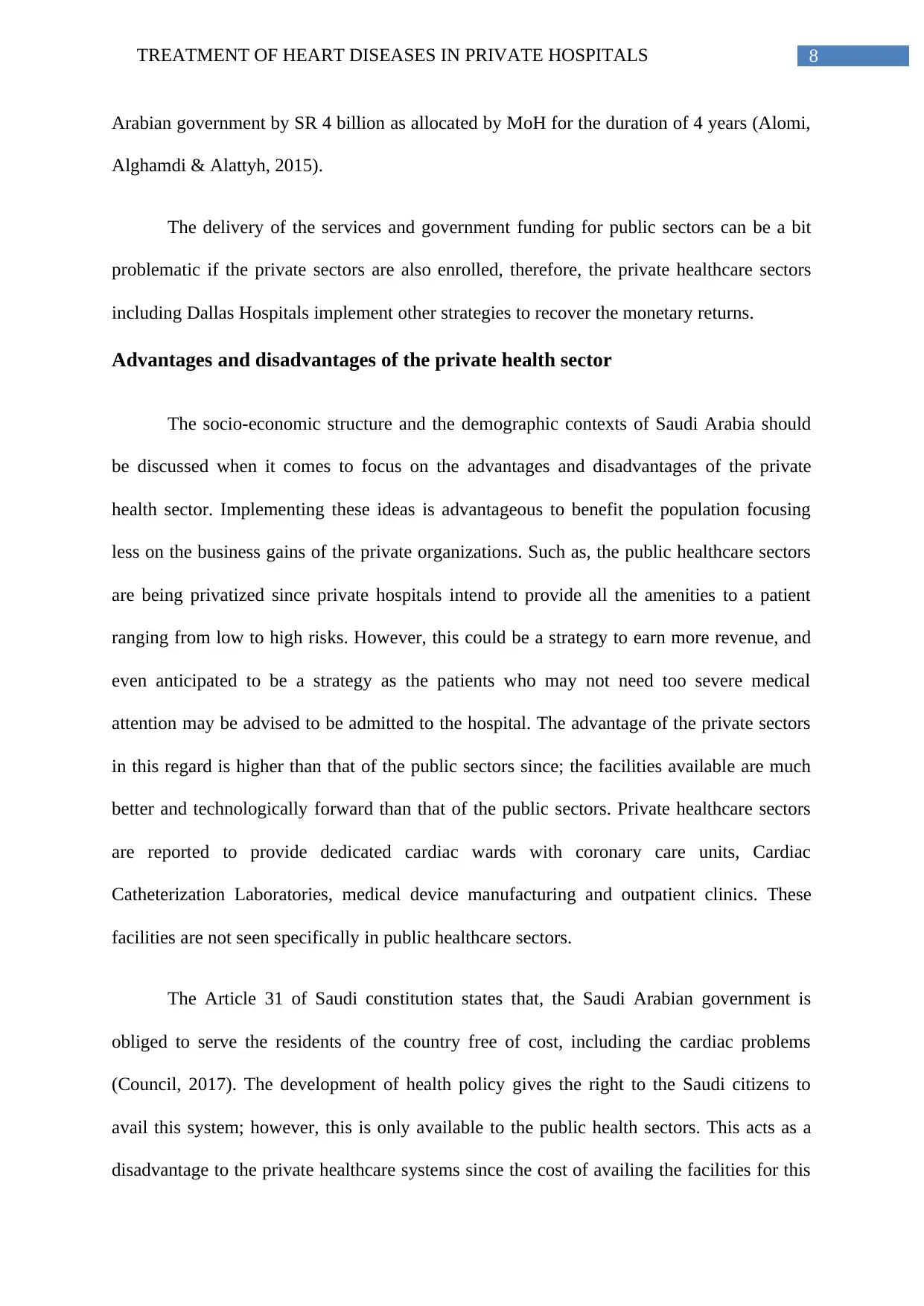
8TREATMENT OF HEART DISEASES IN PRIVATE HOSPITALS
Arabian government by SR 4 billion as allocated by MoH for the duration of 4 years (Alomi,
Alghamdi & Alattyh, 2015).
The delivery of the services and government funding for public sectors can be a bit
problematic if the private sectors are also enrolled, therefore, the private healthcare sectors
including Dallas Hospitals implement other strategies to recover the monetary returns.
Advantages and disadvantages of the private health sector
The socio-economic structure and the demographic contexts of Saudi Arabia should
be discussed when it comes to focus on the advantages and disadvantages of the private
health sector. Implementing these ideas is advantageous to benefit the population focusing
less on the business gains of the private organizations. Such as, the public healthcare sectors
are being privatized since private hospitals intend to provide all the amenities to a patient
ranging from low to high risks. However, this could be a strategy to earn more revenue, and
even anticipated to be a strategy as the patients who may not need too severe medical
attention may be advised to be admitted to the hospital. The advantage of the private sectors
in this regard is higher than that of the public sectors since; the facilities available are much
better and technologically forward than that of the public sectors. Private healthcare sectors
are reported to provide dedicated cardiac wards with coronary care units, Cardiac
Catheterization Laboratories, medical device manufacturing and outpatient clinics. These
facilities are not seen specifically in public healthcare sectors.
The Article 31 of Saudi constitution states that, the Saudi Arabian government is
obliged to serve the residents of the country free of cost, including the cardiac problems
(Council, 2017). The development of health policy gives the right to the Saudi citizens to
avail this system; however, this is only available to the public health sectors. This acts as a
disadvantage to the private healthcare systems since the cost of availing the facilities for this
Arabian government by SR 4 billion as allocated by MoH for the duration of 4 years (Alomi,
Alghamdi & Alattyh, 2015).
The delivery of the services and government funding for public sectors can be a bit
problematic if the private sectors are also enrolled, therefore, the private healthcare sectors
including Dallas Hospitals implement other strategies to recover the monetary returns.
Advantages and disadvantages of the private health sector
The socio-economic structure and the demographic contexts of Saudi Arabia should
be discussed when it comes to focus on the advantages and disadvantages of the private
health sector. Implementing these ideas is advantageous to benefit the population focusing
less on the business gains of the private organizations. Such as, the public healthcare sectors
are being privatized since private hospitals intend to provide all the amenities to a patient
ranging from low to high risks. However, this could be a strategy to earn more revenue, and
even anticipated to be a strategy as the patients who may not need too severe medical
attention may be advised to be admitted to the hospital. The advantage of the private sectors
in this regard is higher than that of the public sectors since; the facilities available are much
better and technologically forward than that of the public sectors. Private healthcare sectors
are reported to provide dedicated cardiac wards with coronary care units, Cardiac
Catheterization Laboratories, medical device manufacturing and outpatient clinics. These
facilities are not seen specifically in public healthcare sectors.
The Article 31 of Saudi constitution states that, the Saudi Arabian government is
obliged to serve the residents of the country free of cost, including the cardiac problems
(Council, 2017). The development of health policy gives the right to the Saudi citizens to
avail this system; however, this is only available to the public health sectors. This acts as a
disadvantage to the private healthcare systems since the cost of availing the facilities for this
⊘ This is a preview!⊘
Do you want full access?
Subscribe today to unlock all pages.

Trusted by 1+ million students worldwide
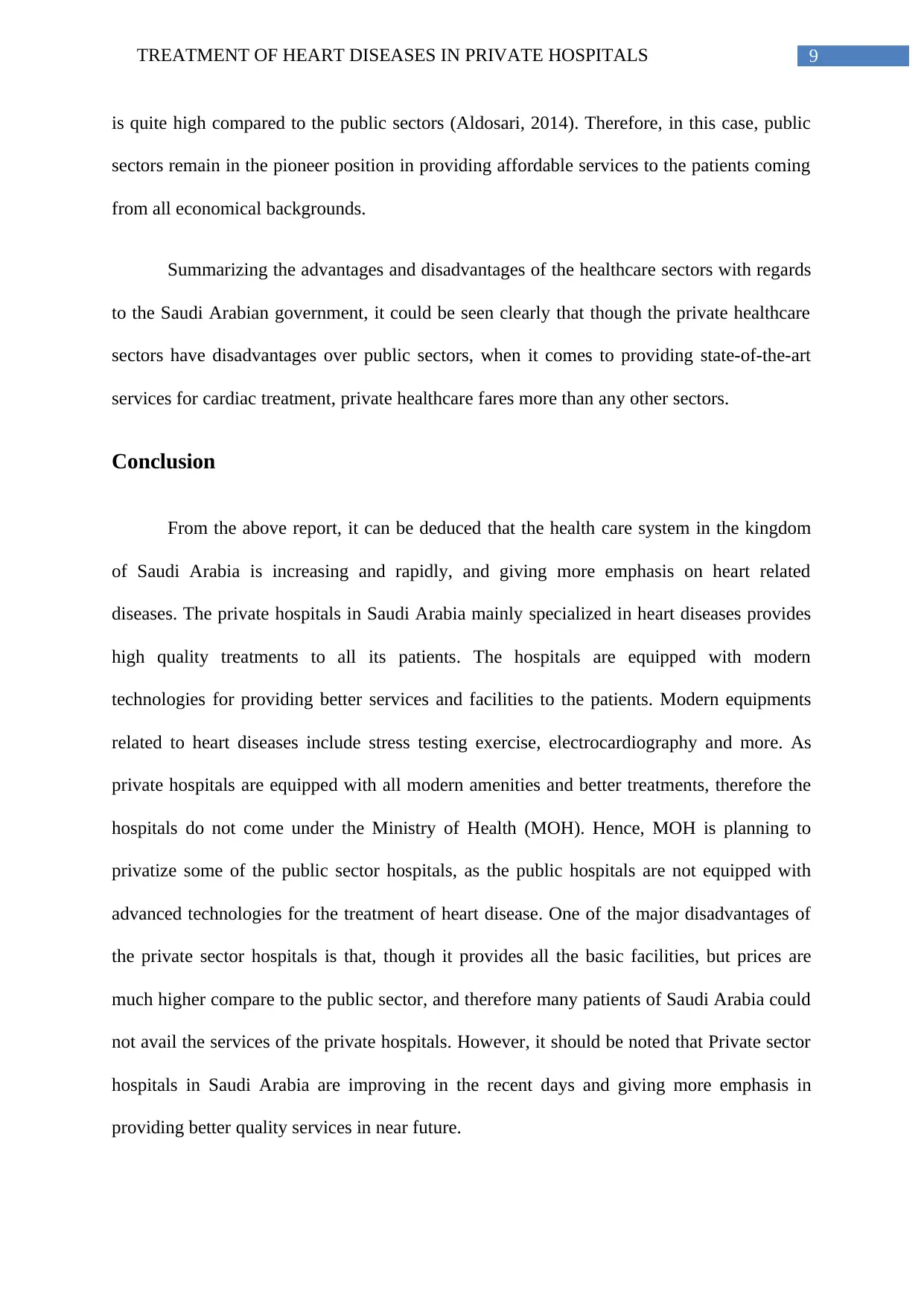
9TREATMENT OF HEART DISEASES IN PRIVATE HOSPITALS
is quite high compared to the public sectors (Aldosari, 2014). Therefore, in this case, public
sectors remain in the pioneer position in providing affordable services to the patients coming
from all economical backgrounds.
Summarizing the advantages and disadvantages of the healthcare sectors with regards
to the Saudi Arabian government, it could be seen clearly that though the private healthcare
sectors have disadvantages over public sectors, when it comes to providing state-of-the-art
services for cardiac treatment, private healthcare fares more than any other sectors.
Conclusion
From the above report, it can be deduced that the health care system in the kingdom
of Saudi Arabia is increasing and rapidly, and giving more emphasis on heart related
diseases. The private hospitals in Saudi Arabia mainly specialized in heart diseases provides
high quality treatments to all its patients. The hospitals are equipped with modern
technologies for providing better services and facilities to the patients. Modern equipments
related to heart diseases include stress testing exercise, electrocardiography and more. As
private hospitals are equipped with all modern amenities and better treatments, therefore the
hospitals do not come under the Ministry of Health (MOH). Hence, MOH is planning to
privatize some of the public sector hospitals, as the public hospitals are not equipped with
advanced technologies for the treatment of heart disease. One of the major disadvantages of
the private sector hospitals is that, though it provides all the basic facilities, but prices are
much higher compare to the public sector, and therefore many patients of Saudi Arabia could
not avail the services of the private hospitals. However, it should be noted that Private sector
hospitals in Saudi Arabia are improving in the recent days and giving more emphasis in
providing better quality services in near future.
is quite high compared to the public sectors (Aldosari, 2014). Therefore, in this case, public
sectors remain in the pioneer position in providing affordable services to the patients coming
from all economical backgrounds.
Summarizing the advantages and disadvantages of the healthcare sectors with regards
to the Saudi Arabian government, it could be seen clearly that though the private healthcare
sectors have disadvantages over public sectors, when it comes to providing state-of-the-art
services for cardiac treatment, private healthcare fares more than any other sectors.
Conclusion
From the above report, it can be deduced that the health care system in the kingdom
of Saudi Arabia is increasing and rapidly, and giving more emphasis on heart related
diseases. The private hospitals in Saudi Arabia mainly specialized in heart diseases provides
high quality treatments to all its patients. The hospitals are equipped with modern
technologies for providing better services and facilities to the patients. Modern equipments
related to heart diseases include stress testing exercise, electrocardiography and more. As
private hospitals are equipped with all modern amenities and better treatments, therefore the
hospitals do not come under the Ministry of Health (MOH). Hence, MOH is planning to
privatize some of the public sector hospitals, as the public hospitals are not equipped with
advanced technologies for the treatment of heart disease. One of the major disadvantages of
the private sector hospitals is that, though it provides all the basic facilities, but prices are
much higher compare to the public sector, and therefore many patients of Saudi Arabia could
not avail the services of the private hospitals. However, it should be noted that Private sector
hospitals in Saudi Arabia are improving in the recent days and giving more emphasis in
providing better quality services in near future.
Paraphrase This Document
Need a fresh take? Get an instant paraphrase of this document with our AI Paraphraser
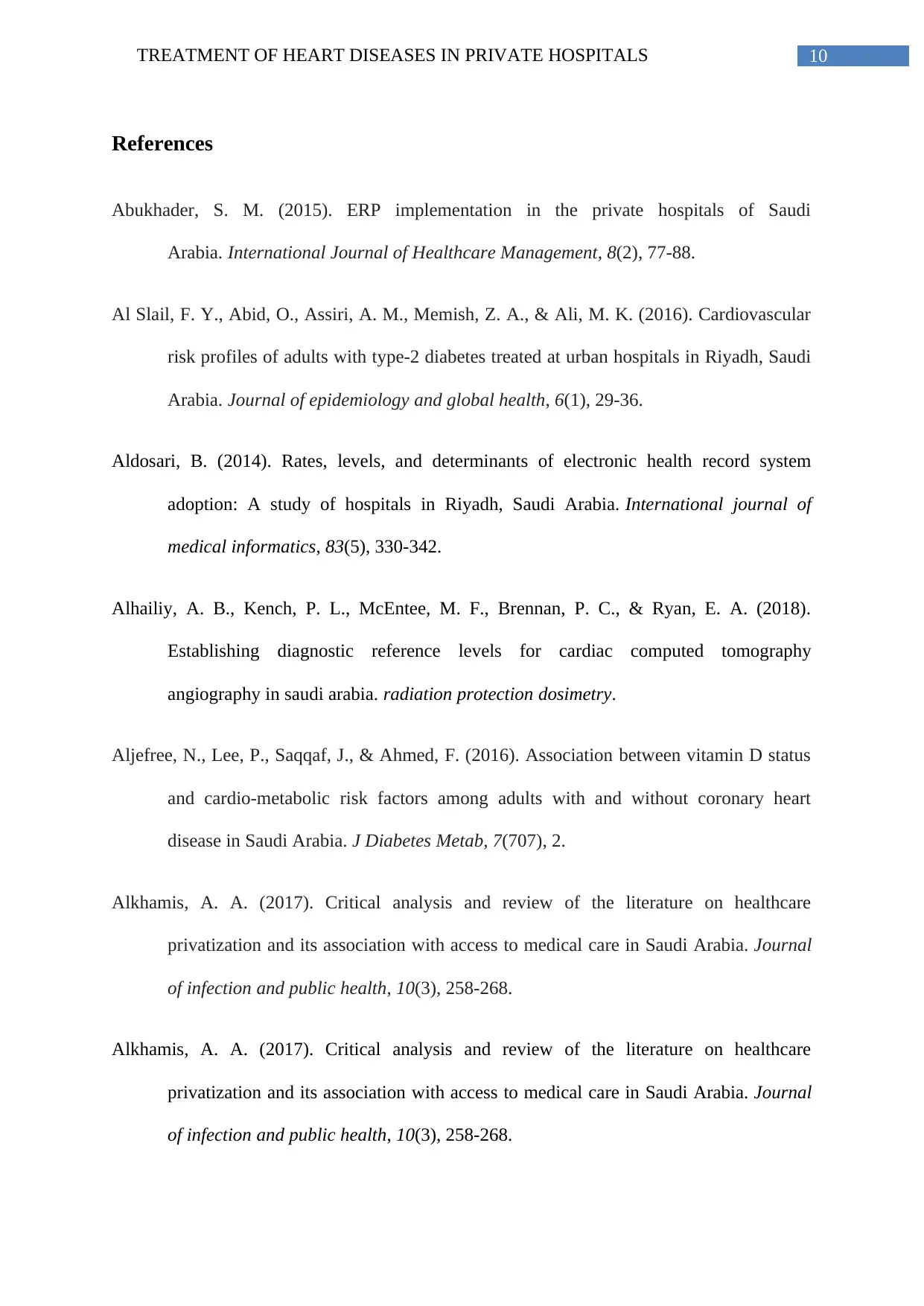
10TREATMENT OF HEART DISEASES IN PRIVATE HOSPITALS
References
Abukhader, S. M. (2015). ERP implementation in the private hospitals of Saudi
Arabia. International Journal of Healthcare Management, 8(2), 77-88.
Al Slail, F. Y., Abid, O., Assiri, A. M., Memish, Z. A., & Ali, M. K. (2016). Cardiovascular
risk profiles of adults with type-2 diabetes treated at urban hospitals in Riyadh, Saudi
Arabia. Journal of epidemiology and global health, 6(1), 29-36.
Aldosari, B. (2014). Rates, levels, and determinants of electronic health record system
adoption: A study of hospitals in Riyadh, Saudi Arabia. International journal of
medical informatics, 83(5), 330-342.
Alhailiy, A. B., Kench, P. L., McEntee, M. F., Brennan, P. C., & Ryan, E. A. (2018).
Establishing diagnostic reference levels for cardiac computed tomography
angiography in saudi arabia. radiation protection dosimetry.
Aljefree, N., Lee, P., Saqqaf, J., & Ahmed, F. (2016). Association between vitamin D status
and cardio-metabolic risk factors among adults with and without coronary heart
disease in Saudi Arabia. J Diabetes Metab, 7(707), 2.
Alkhamis, A. A. (2017). Critical analysis and review of the literature on healthcare
privatization and its association with access to medical care in Saudi Arabia. Journal
of infection and public health, 10(3), 258-268.
Alkhamis, A. A. (2017). Critical analysis and review of the literature on healthcare
privatization and its association with access to medical care in Saudi Arabia. Journal
of infection and public health, 10(3), 258-268.
References
Abukhader, S. M. (2015). ERP implementation in the private hospitals of Saudi
Arabia. International Journal of Healthcare Management, 8(2), 77-88.
Al Slail, F. Y., Abid, O., Assiri, A. M., Memish, Z. A., & Ali, M. K. (2016). Cardiovascular
risk profiles of adults with type-2 diabetes treated at urban hospitals in Riyadh, Saudi
Arabia. Journal of epidemiology and global health, 6(1), 29-36.
Aldosari, B. (2014). Rates, levels, and determinants of electronic health record system
adoption: A study of hospitals in Riyadh, Saudi Arabia. International journal of
medical informatics, 83(5), 330-342.
Alhailiy, A. B., Kench, P. L., McEntee, M. F., Brennan, P. C., & Ryan, E. A. (2018).
Establishing diagnostic reference levels for cardiac computed tomography
angiography in saudi arabia. radiation protection dosimetry.
Aljefree, N., Lee, P., Saqqaf, J., & Ahmed, F. (2016). Association between vitamin D status
and cardio-metabolic risk factors among adults with and without coronary heart
disease in Saudi Arabia. J Diabetes Metab, 7(707), 2.
Alkhamis, A. A. (2017). Critical analysis and review of the literature on healthcare
privatization and its association with access to medical care in Saudi Arabia. Journal
of infection and public health, 10(3), 258-268.
Alkhamis, A. A. (2017). Critical analysis and review of the literature on healthcare
privatization and its association with access to medical care in Saudi Arabia. Journal
of infection and public health, 10(3), 258-268.
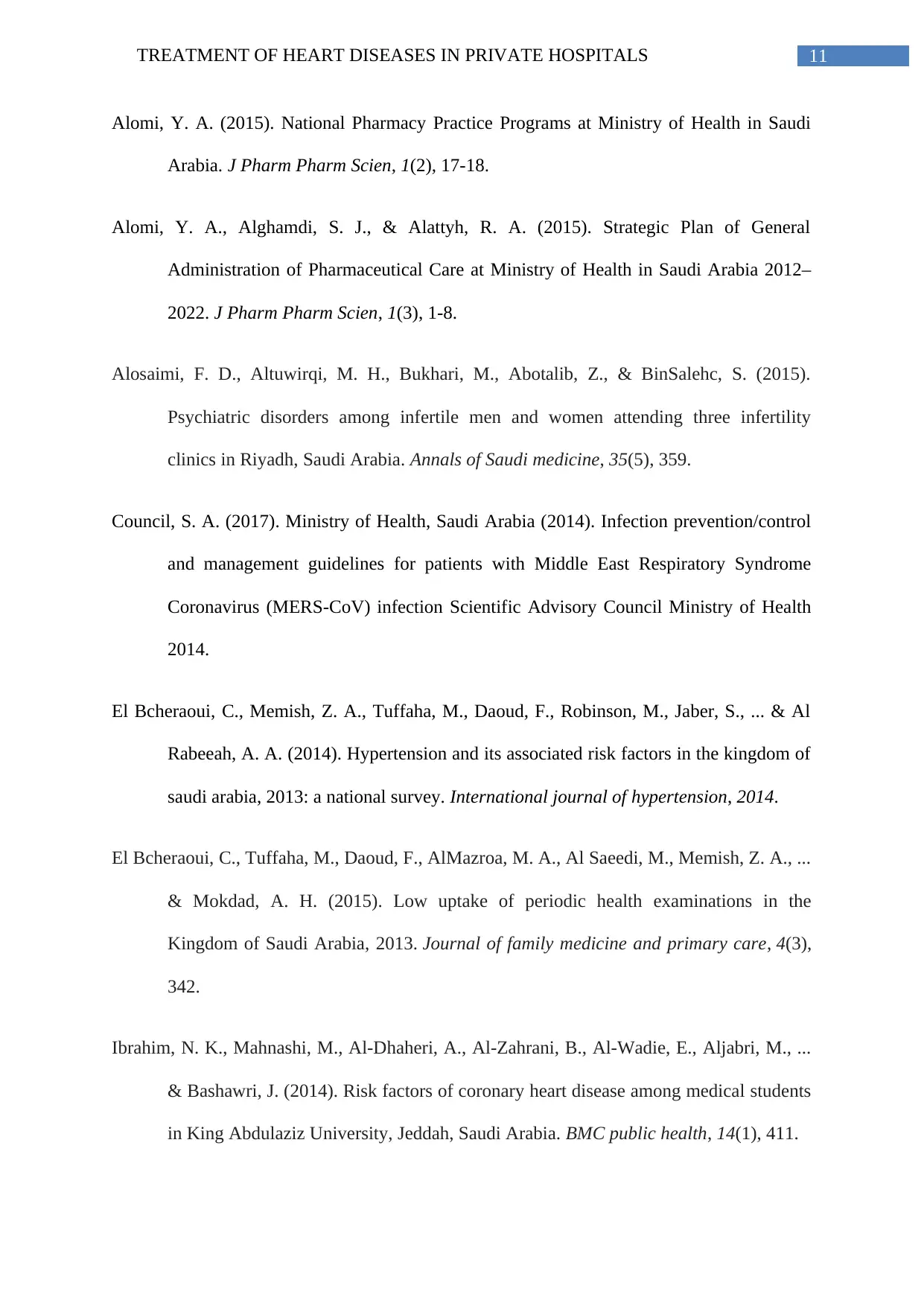
11TREATMENT OF HEART DISEASES IN PRIVATE HOSPITALS
Alomi, Y. A. (2015). National Pharmacy Practice Programs at Ministry of Health in Saudi
Arabia. J Pharm Pharm Scien, 1(2), 17-18.
Alomi, Y. A., Alghamdi, S. J., & Alattyh, R. A. (2015). Strategic Plan of General
Administration of Pharmaceutical Care at Ministry of Health in Saudi Arabia 2012–
2022. J Pharm Pharm Scien, 1(3), 1-8.
Alosaimi, F. D., Altuwirqi, M. H., Bukhari, M., Abotalib, Z., & BinSalehc, S. (2015).
Psychiatric disorders among infertile men and women attending three infertility
clinics in Riyadh, Saudi Arabia. Annals of Saudi medicine, 35(5), 359.
Council, S. A. (2017). Ministry of Health, Saudi Arabia (2014). Infection prevention/control
and management guidelines for patients with Middle East Respiratory Syndrome
Coronavirus (MERS-CoV) infection Scientific Advisory Council Ministry of Health
2014.
El Bcheraoui, C., Memish, Z. A., Tuffaha, M., Daoud, F., Robinson, M., Jaber, S., ... & Al
Rabeeah, A. A. (2014). Hypertension and its associated risk factors in the kingdom of
saudi arabia, 2013: a national survey. International journal of hypertension, 2014.
El Bcheraoui, C., Tuffaha, M., Daoud, F., AlMazroa, M. A., Al Saeedi, M., Memish, Z. A., ...
& Mokdad, A. H. (2015). Low uptake of periodic health examinations in the
Kingdom of Saudi Arabia, 2013. Journal of family medicine and primary care, 4(3),
342.
Ibrahim, N. K., Mahnashi, M., Al-Dhaheri, A., Al-Zahrani, B., Al-Wadie, E., Aljabri, M., ...
& Bashawri, J. (2014). Risk factors of coronary heart disease among medical students
in King Abdulaziz University, Jeddah, Saudi Arabia. BMC public health, 14(1), 411.
Alomi, Y. A. (2015). National Pharmacy Practice Programs at Ministry of Health in Saudi
Arabia. J Pharm Pharm Scien, 1(2), 17-18.
Alomi, Y. A., Alghamdi, S. J., & Alattyh, R. A. (2015). Strategic Plan of General
Administration of Pharmaceutical Care at Ministry of Health in Saudi Arabia 2012–
2022. J Pharm Pharm Scien, 1(3), 1-8.
Alosaimi, F. D., Altuwirqi, M. H., Bukhari, M., Abotalib, Z., & BinSalehc, S. (2015).
Psychiatric disorders among infertile men and women attending three infertility
clinics in Riyadh, Saudi Arabia. Annals of Saudi medicine, 35(5), 359.
Council, S. A. (2017). Ministry of Health, Saudi Arabia (2014). Infection prevention/control
and management guidelines for patients with Middle East Respiratory Syndrome
Coronavirus (MERS-CoV) infection Scientific Advisory Council Ministry of Health
2014.
El Bcheraoui, C., Memish, Z. A., Tuffaha, M., Daoud, F., Robinson, M., Jaber, S., ... & Al
Rabeeah, A. A. (2014). Hypertension and its associated risk factors in the kingdom of
saudi arabia, 2013: a national survey. International journal of hypertension, 2014.
El Bcheraoui, C., Tuffaha, M., Daoud, F., AlMazroa, M. A., Al Saeedi, M., Memish, Z. A., ...
& Mokdad, A. H. (2015). Low uptake of periodic health examinations in the
Kingdom of Saudi Arabia, 2013. Journal of family medicine and primary care, 4(3),
342.
Ibrahim, N. K., Mahnashi, M., Al-Dhaheri, A., Al-Zahrani, B., Al-Wadie, E., Aljabri, M., ...
& Bashawri, J. (2014). Risk factors of coronary heart disease among medical students
in King Abdulaziz University, Jeddah, Saudi Arabia. BMC public health, 14(1), 411.
⊘ This is a preview!⊘
Do you want full access?
Subscribe today to unlock all pages.

Trusted by 1+ million students worldwide
1 out of 13
Related Documents
Your All-in-One AI-Powered Toolkit for Academic Success.
+13062052269
info@desklib.com
Available 24*7 on WhatsApp / Email
![[object Object]](/_next/static/media/star-bottom.7253800d.svg)
Unlock your academic potential
Copyright © 2020–2026 A2Z Services. All Rights Reserved. Developed and managed by ZUCOL.





